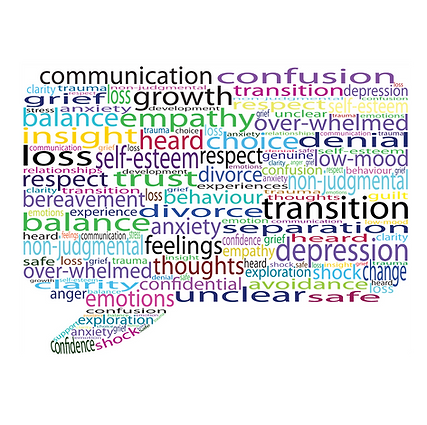Cheryl Williams Counselling and Psychotherapy
MBACP Accredited Counsellor, Psychotherapist and Supervisor
Integrative Counselling
We are all unique and therefore psychological distress is wide ranging
and distinctive to the individual.
While there are many ways of understanding psychological distress
and all counselling approaches hold value, relying on one therapeutic
model and a ‘one size fits all’ approach can lose sight of your individuality.
As an integrative counsellor, I draw on humanistic counselling,
psychodynamic theory, Internal Family Systems (IFS) and cognitive
behavioural therapy (CBT) to tailor the therapeutic process
and meet your individual needs.
Overview of therapies
Person-Centred Counselling
Developed by Carl Rogers, Person-centred counselling is based on the view that with the right conditions, everyone has the capacity and desire for personal growth and change. Rogers' considered we all have an innate tendency to develop our full potential, however life experiences, particularly those that affect our sense of value, can prevent us from reaching our full potential. Holding the belief that you are the expert in your own life, I offer an empathic, non-judgmental and congruent therapeutic relationship, in which exploration of your thoughts and feelings can provide a deeper understanding of who you are and how you feel. Focusing on self-exploration encourages psychological understanding, self-development and personal growth. This self-awareness can enhance self-esteem and communication, support the development of personal choices and encourage the realisation or fulfilment of your talents and full-potential.
Transactional Analysis (T.A)
Developed by Eric Berne, T.A is based on the theory that we have three ego states; Parent, Adult and Child. These ego states determine how we express ourselves, interact with one another and form relationships. Offering a link between your past and how this influences your decisions and choices, exploring your communication patterns alongside other key T.A concepts can promote personal growth and change.
Internal Family Systems (I.F.S)
Developed by Dr. Richard Schwartz, IFS theorises our psyche as a system of distinct yet interconnected inner parts. These parts hold unique emotions, beliefs and memories that shape our experiences and behaviours. Throughout our therapeutic journey, I will guide you in exploring and understanding these internal dynamics, encouraging a compassionate and inquisitive relationship with each part. Acknowledging and unburdening these inner aspects can foster self-awareness, promoting healing and a more harmonious integration of your inner world.
Psychodynamic Theory
Rooted in the work of Freud’s psychoanalysis, the psychodynamic approach incorporates analytic theories which aim
to develop insight into the influence of your past on your thoughts, feelings and behaviour. This approach takes the view that the unconscious mind retains deep-rooted painful feelings and memories from childhood experiences. Too difficult
for the conscious mind to process, unhealthy defence mechanisms develop to protect these feelings and experiences
from surfacing. Within a safe and supportive therapeutic relationship, repressed feelings and memories can be brought
into consciousness, where they can be expressed, explored, understood and resolved. Working within this approach
can facilitate positive change in your thinking, decision making and relationships.
Cognitive Behaviour Therapy (CBT)
The CBT model focuses on the impact of thoughts, beliefs and attitudes on our feelings and behaviour. Our thoughts
and behaviour are closely connected, consequently by changing the way we think and behave we can change the way
we feel. Although the effects of past events and experiences are taken into consideration, CBT is rooted in the present, targeting current issues that are causing distress. Through a collaborative partnership and with assignments between sessions, we can identify and develop positive strategies to change negative thinking patterns and learnt behaviours.
